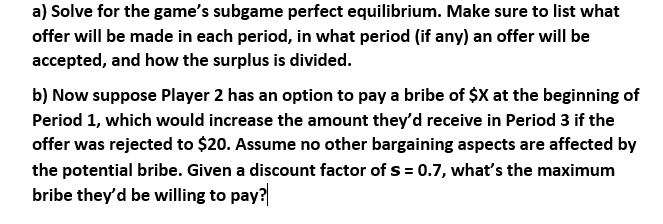a) Solve for the game's subgame perfect equilibrium. Make sure to list what offer will be made in each period, in what period (if any) an offer will be accepted, and how the surplus is divided. b) Now suppose Player 2 has an option to pay a bribe of $X at the beginning of Period 1, which would increase the amount they'd receive in Period 3 if the offer was rejected to $20. Assume no other bargaining aspects are affected by the potential bribe. Given a discount factor of s = 0.7, what's the maximum bribe they'd be willing to pay?
a) Solve for the game's subgame perfect equilibrium. Make sure to list what offer will be made in each period, in what period (if any) an offer will be accepted, and how the surplus is divided. b) Now suppose Player 2 has an option to pay a bribe of $X at the beginning of Period 1, which would increase the amount they'd receive in Period 3 if the offer was rejected to $20. Assume no other bargaining aspects are affected by the potential bribe. Given a discount factor of s = 0.7, what's the maximum bribe they'd be willing to pay?
Managerial Economics: A Problem Solving Approach
5th Edition
ISBN:9781337106665
Author:Luke M. Froeb, Brian T. McCann, Michael R. Ward, Mike Shor
Publisher:Luke M. Froeb, Brian T. McCann, Michael R. Ward, Mike Shor
Chapter17: Making Decisions With Uncertainty
Section: Chapter Questions
Problem 17.5IP
Related questions
Question
The question is an two-part economics applied theory exercise.

Transcribed Image Text:Period 1: Player 1 proposes sı to keep and (1-s1) for Player 2 to accept. If Player 2 accepts the
offer, the game is over and the proposed shares are paid out. If Player 2 rejects the Period 1 offer,
the game proceeds to Period 2.
Period 2: Player 2 proposes s2 for Player 1 to keep and (1-s2) for themselves. If Player 1 accepts,
the game is over. If Player 1 rejects, the game goes to a third and final round.
Period 3: Player 1 proposes s3 to keep and (1-s3) for Player 2 to accept. If Player 2 accepts the
offer, the game is over and the proposed shares are paid out. If Player 2 rejects the Period 3 offer,
both players immediately receive $10. The remaining $80 is lost to arbitrators in the court system.
In this sequential bargaining problem, the discount factor is 8 = 0.7.

Transcribed Image Text:a) Solve for the game's subgame perfect equilibrium. Make sure to list what
offer will be made in each period, in what period (if any) an offer will be
accepted, and how the surplus is divided.
b) Now suppose Player 2 has an option to pay a bribe of $X at the beginning of
Period 1, which would increase the amount they'd receive in Period 3 if the
offer was rejected to $20. Assume no other bargaining aspects are affected by
the potential bribe. Given a discount factor of s = 0.7, what's the maximum
bribe they'd be willing to pay?
Expert Solution
This question has been solved!
Explore an expertly crafted, step-by-step solution for a thorough understanding of key concepts.
Step by step
Solved in 3 steps with 2 images

Knowledge Booster
Learn more about
Need a deep-dive on the concept behind this application? Look no further. Learn more about this topic, economics and related others by exploring similar questions and additional content below.Recommended textbooks for you

Managerial Economics: A Problem Solving Approach
Economics
ISBN:
9781337106665
Author:
Luke M. Froeb, Brian T. McCann, Michael R. Ward, Mike Shor
Publisher:
Cengage Learning


Managerial Economics: Applications, Strategies an…
Economics
ISBN:
9781305506381
Author:
James R. McGuigan, R. Charles Moyer, Frederick H.deB. Harris
Publisher:
Cengage Learning

Managerial Economics: A Problem Solving Approach
Economics
ISBN:
9781337106665
Author:
Luke M. Froeb, Brian T. McCann, Michael R. Ward, Mike Shor
Publisher:
Cengage Learning


Managerial Economics: Applications, Strategies an…
Economics
ISBN:
9781305506381
Author:
James R. McGuigan, R. Charles Moyer, Frederick H.deB. Harris
Publisher:
Cengage Learning